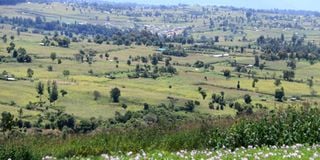Why women with disability have a right to inherit, own land

An aerial view of Nessuit centre in Eastern Mau, Nakuru County. Women with disability have the right to inherit and own land.
What you need to know:
- The Law of Succession Act (Cap.160) doesn't discriminate. Nowhere does it mention that a spouse or a child with disability is not entitled to either life interest or inheritance.
- The Persons with Disabilities Act (2003) does not expressly affirm the rights of women with disabilities to own or inherit land, but Article 40 (1) of the Constitution dictates that every person has a right, either individually or in association with others, to acquire and own property.
Recently, I interviewed a paralegal who fights for the rights of persons living with disabilities in Kisumu County.
In her strive, she commits to securing their inheritance, often violently and disgustingly taken away by relatives.
Of the many questions angered relatives throw at her is: “This woman is disabled, does she even deserve to own or inherit land?”
She said communities see no value in women with disabilities. They consider them useless and undeserving of property ownership.
But what does the law say about their rights to land and property ownership?
The Persons with Disabilities Act (2003) does not expressly affirm the rights of women with disabilities to own or inherit land, but Article 40 (1) of the Constitution dictates that every person has a right, either individually or in association with others, to acquire and own property.
Further, no one is allowed to deprive another person of property or right or interest in any property on any ground, including disability and gender. This is prohibited in Article 40(2b) of the Constitution.
The Law of Succession Act (Cap.160) doesn't discriminate. Nowhere does it mention that a spouse or a child with disability is not entitled to either life interest or inheritance.
Neither does the Matrimonial Property Act (2013) provide for such parameters in case of a dissolution of marriage.
Unfortunately, there is no data on women with disabilities owning land in Kenya.
Instead, Kenya Demographic and Health Survey (2022) tells us that by 2022, 75 per cent of women did not own agricultural land. Neither did 93 per of them possess non-agricultural land.
In reality, the country has more disabled women than men, which implies that in the event of applying the discriminatory principle, the women will suffer the most.
According to the 2019 census, of the 900,000 Kenyans with some form of disability, 2.5 per cent are women while 1.9 per cent are men.
Why is land important to women with disabilities?
“Granting rights to land to women who are disabled is essential for their wellbeing, economic growth and overall social stability,” points out Dr Robert Wayumba, a senior land tenure specialist at Landesa, which promotes pro-poor and gender-sensitive land laws across the world.
He further reminds communities that “land is a fundamental source of production that enables people to feel secure in their belonging rights to a particular place, to grow crops, food and nutrition, and even to trade in land as an economic product.”
As grounded in the Constitution’s Bill of Rights, respecting the rights of women with disabilities to own land and property is honouring and protecting their human rights and fundamental freedoms as a means of preserving human dignity and promoting social justice, he says.
What can be done to enable women with disabilities access and own land?
Dr Robert exemplifies how that can happen:
“Something good happened recently in Kakamega County. A disabled daughter finally got her inheritance.
“Years ago, Nafula* lost both her parents. She was born with a physical disability. Her father died first, followed by her mother. Immediately after the burial of her mother, her only uncle, the brother to her father, moved into their home, and took over everything: cows, chickens and land.
“Years later, a local paralegal, who had been trained by several civil society organisations in securing women's land rights, heard of her plight, and took it upon herself to help Nafula.
“The paralegal approached several government officers and relentlessly pursued the case. She helped her through the land succession process involving the police, chief and various government officers. Finally, she obtained a title deed and now Nafula is a proud land owner.”
How land can change the lives of women with disabilities
Dr Robert says research has proved that women who have secure rights to land have a greater ability to contribute to the family and society welfare.
“The odds that a child is severely underweight are reduced by half if the mother owns land,” he says.
“And when women in the household have land rights, children have higher levels of educational attainment.”





